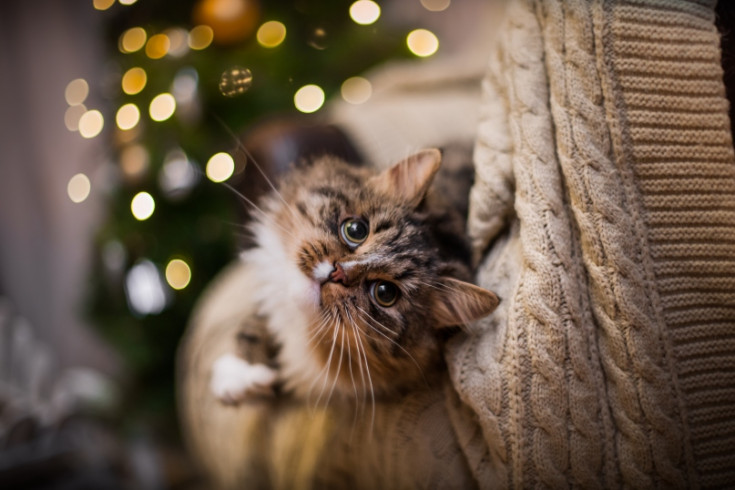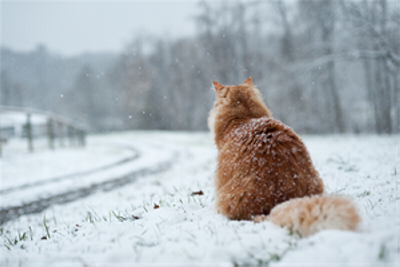
What are the biggest dangers for cats over the winter months?
Winter can be a strange time for our cats. For part of the season their usual home environment is typically filled with unusual trees and flowers and there are also odd noises such as fireworks and crackers to contend with. The cold weather also brings extra risks for indoor and outdoor cats.
We’ve drawn up a list of some of the main hazards to look out for.
If you’re worried your cat is sick or injured as a result of any of these, please contact your vet as soon as possible, or find your nearest Vets Now pet emergency clinic or Vets Now 24/7 hospital.
1. Food dangers
Chocolate, onions, nuts, blue cheese, fruit cakes, puddings and mince pies can all be toxic to cats. Watch out for turkey and chicken bones as these can cause choking, constipation or, in the most serious cases, damage to your cat’s intestines.
2. Road traffic accidents
Indoor cats don’t get hit by cars. If you decide to let your cat out, try to train her to be out during the day and in overnight as the majority of cats are hit by cars during the hours of darkness.
We see a significant increase in road traffic accidents in the winter after the clocks have gone back – so try to ensure your cat is back safely in the house by the time darkness falls and rush hour begins. Remember also to microchip her. This will increase the chance of you being reunited should anything happen.
Is your cat safe outdoors? Read our comprehensive article on the dangers of letting your cat outside and how to keep her safe.
3. Antifreeze poisoning
The worst of all the winter time chemical spills is antifreeze, which can leak from a car’s radiator. Ingestion of ethylene glycol, the main ingredient in antifreeze, is highly dangerous for cats.
To make matters worse it’s sweet tasting and very palatable and even a relatively small quantity can cause potentially fatal kidney damage. The first signs of intoxication are often your cat appears drunk.
If you know your cat has swallowed antifreeze or you have any concerns, contact your vet immediately. The prognosis becomes poorer the longer the delay between ingestion and treatment.
Would you know what to do if your cat swallowed antifreeze? Read our full guide here.

4. Ice, snow and grit
Check your cat’s paws regularly for any signs of injury. We occasionally see cases of frostbite, in ears and paws, and more regularly interdigital dermatitis, sore and irritated paws, as a result of irritation from salt and grit.
5. Exercise and obesity
With fewer daylight hours, and cold, wet weather you may find your cat does not exercise as much he does in the summer. It’s a good idea to monitor his weight, and food intake, as you may need to reduce the amount of food you give your cat over the winter months.
Just like humans, obesity in pets is a growing problem and it can result in serious adverse health effects. These include diabetes, liver disease and increased surgical and anesthetic risk.
Suggested Tweet
Learn about the 8 most common dangers for #cats this #Christmas, with @VetsNowUK: https://goo.gl/kvD2eE
6. Batteries
Ingestion of batteries is common at this time of year. If the battery is chewed and pierced it can cause chemical burns and heavy metal poisoning. And if swallowed whole it can lead to an obstruction.
All batteries are potentially toxic so if you suspect your cat has chewed or swallowed one speak to your vet or, out of hours, contact your nearest Vets Now emergency clinic.
7. Christmas trees and festive houseplants
Most Christmas tree species are low toxicity but may cause a mild stomach upset.
The poinsettia’s brightly coloured leaves contain an irritant sap. The plant is poisonous if ingested in large quantities but, because of the taste and irritation from the sap, it’s unlikely your cat would ingest enough to be seriously ill. To be on the safe side, keep poinsettias out of your cat’s reach.
All parts of the lily plant are poisonous and can cause kidney failure. Contact your vet – or out of hours, your nearest Vets Now clinic or 24/7 hospital – straight away if your cat has chewed on or eaten a lily.
Read our guide on what to do if you’re worried your pet has eaten something poisonous.
8. Hot spots
Cats love curling up in warm places for a nap. Prevent potential burns, and indeed fires, by protecting your cat from open fireplaces, wood stoves and space heaters.
Warm engines are also a favourite place for outdoor cats, so peep your horn or bang on the bonnet before starting your car on cold winter’s mornings.
It’s amazing how many times motorists have discovered a cat hiding in their engine when they’ve arrived at their work. It’s worth making sure your cat’s wearing an identification disc and is microchipped, with up-to-date contact details, to increase the chance of him being found should he go missing.
